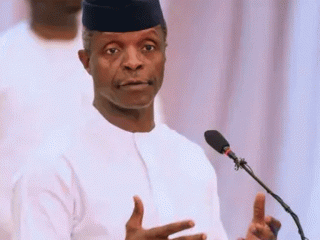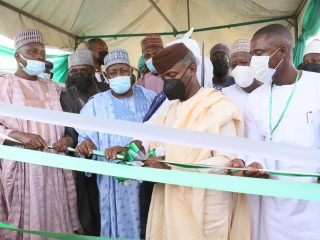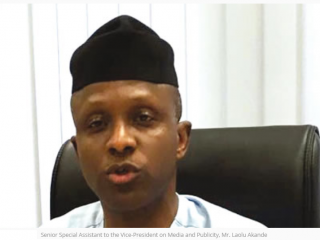FG Targets N7bn Revenue, $10m from Solar Power Rollout
-By Emmanuel Addeh
The federal government yesterday officially launched the five million solar power connections scheme nationwide,
assuring that it will benefit 25 million Nigerians and catalyse economic activities for benefitting communities.
The government expressed the hope that if well implemented, the scheme will generate N7 billion in taxes and $10 billion
in import substitution every year.
It noted that the programme will not only support the economic recovery efforts in response to the Covid-19 pandemic,
but will also increase local content in the off-grid solar value chain and facilitate the growth of the local manufacturing
and assembly industry.
A statement issued to journalists during the event by the Rural Electrification Agency (REA), the implementing
agency, quoted the Vice President Yemi Osinbajo, as saying that the solar mini-grid programme will incentivise
the creation of 250,000 new jobs in the energy sector.
“This programme is expected to generate an additional N7 billion increase in tax revenues per annum and
$10 million in annual import substitution. The solar connection scheme is a federal government initiative
with the objective to expand energy access to 25 million individuals (five million new connections)
through the provision of Solar Home Systems (SHS) or connection to a mini grid,” he said.
In addition, Osinbajo noted that the solar connection intervention facility from the Central Bank of
Nigeria (CBN), will complement the federal government’s efforts to provide affordable electricity to
unserved rural communities.
“This will be done through the provision of long-term low interest credit facilities to the Nigeria
Electrification Project (NEP) pre-qualified SHS distributors and mini grid development companies.
This also includes qualified home solar value chain players such as manufacturers and assemblers of solar components.
The Nigerian government is committed to resolving the challenges and delivering the president’s objective to deliver
efficient, stable, and reliable power to Nigerians and put Nigeria on the path to economic recovery,” Osinbajo said.
Speaking during the event, the Managing Director of REA, Mr. Ahmad Salihijo, reiterated that the “Solar Power Naija
Programme,” seeks to connect five million unserved and underserved households and businesses and serve about 25 million
Nigerians. He added that it will help address the challenge of access to affordable finance through the CBN facility,
which makes low-cost local currency debt available to qualified companies.
“Private companies will be supported to employ more Nigerians to be able to provide services in the area of manufacturing,
distribution, installation and other project management and after-sales services. Solar power naija will leverage on the
support from our donor partners such as the World Bank, USAID, SEforALL and FCDO in the areas of data on locations,
programme design, manufacturing framework and quality assurance. The programme also supports manufacturers and assemblers
of solar technology to set up production facilities in Nigeria, in order to support the off-grid energy sector with
about 250,000 new jobs, ” Salihijo stressed.
He called on the donors to continue providing support to help in making the off-grid sector commercially viable and in
making electricity available and affordable to the off-grid population. “Additionally, this will further confirm our
commitment to reducing our greenhouse gas emissions by 20 per cent by 2030, when compared to the business as usual
levels. I want to encourage other stakeholders from government agencies to donor partners to the private sector to
support us in achieving this huge task of delivering 5 million connections to 25 million Nigerians. Companies involved
in the assembly and manufacturing of components of off-grid solar solutions must be 70 per cent Nigerian owned as the
entire ESP is meant to facilitate and spur local productivity,” the REA boss said.
As the implementing agency of the programme under the supervision of the ministry of power, the REA boss noted
that it further shows government’s commitment towards supporting the private sector to develop decentralised
energy solutions in locations where the grid is not viable or service is inadequate. “I want to encourage private
companies to take advantage of this intervention and work with us towards achieving the set targets under the
programme,” he said.
News source:
https://www.thisdaylive.com/index.php/2020/12/02/fg-targets-n7bn-revenue-10m-from-solar-power-rollout/







































